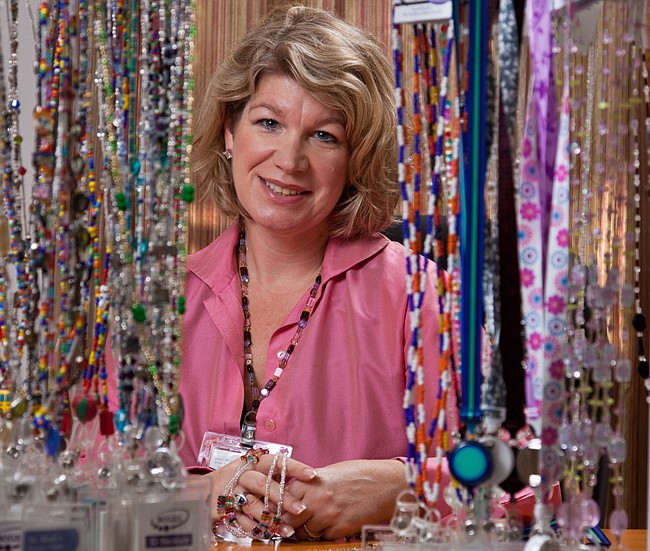Kim Martinez turned a business plan she wrote on the back of a cocktail napkin seven years ago into a thriving $2 million enterprise.
Not bad for a company with a core product that's nothing more than a lanyard necklace for holding an ID badge or eyeglasses. Customers pay about $15 for one.
That's the gist behind Bonitas International, a business Martinez launched with her sister-in-law in 2002 that now has 18 employees in three states. That includes Martinez, Bonitas' chief executive who runs the company from her Sarasota County home office.
“I had always wanted my own business,” says Martinez, who previously worked in executive positions for insurance and travel companies in the Northeast. “But I never had the courage to try.”
Martinez' next challenge, however, will likely take a lot of cocktail napkins and a lot more courage. She wants to transform Bonitas from a nice little $2 million company to a $35 million global juggernaut that sells a full arsenal of stylish workplace and conference ID accessories.
Says Martinez: “Our goal is to be a $35 million company in five to seven years.”
It's a bold statement, especially coming on the heels of a 12-month recession survival effort that nearly sunk the company. That effort included Martinez leveraging just about every dollar to reinvest everything she had and more into the company.
But Martinez succeeded in the early going of Bonitas while she had three children all under the age of three. So odds don't seem to be something that daunt her.
Besides, being bold is old-hat to Martinez. Like the time two years ago when she sent an e-mail to Laura Spencer, who was just promoted to CEO of Tervis Tumbler, a Venice-based drinkware manufacturer. Martinez said she had admired Spencer and wanted to pick her brain.
The pair have since become friends and business confidantes, checking in with each other every few months. “She does a really good job with the big picture,” Spencer says. “She does a lot of planning and setting goals.”
One other small advantage Martinez has on the way to meeting her ambitious goals: Bonitas has had an uncanny knack for getting in front of national media outlets.
The roll call includes a prominent mention in a Nov. 19 column on recession survival tactics in USA Today; an interview in April on the Today Show, during a segment on woman-owned businesses; a write-up in a September 2008 story in the small business section of the Wall Street Journal's online edition; and a profile in Entrepreneur Magazine in March 2008.
The company itself won an award in 2006 from a national nonprofit organization for woman-owned businesses, which generated some good press. But Martinez is at a loss to explain how the company has maintained the good vibes. One possibility, she says, is that she and her business partner, Lisa
Harrington, have brought “innovation to a marketplace that has never seen innovation.”
Risk and reward
Martinez had never seen a stylish ID necklace before December 2002, when she was attending a family Christmas party in Ohio. Back then, Martinez was still in shock over losing what she considered her dream job as an executive for Rosenbluth Travel, a large Philadelphia-based global travel firm.
Martinez had worked for insurance companies before Rosenbluth, and she got a kick out of running a large department, multi-tasking and completing lots of big projects. “I made a lot of money for these companies,” Martinez says, “and I was duly compensated.”
But soon after taking the Rosenbluth job, Martinez began to feel like there was something missing from her high-flying corporate life. For one, she held no ownership of the company, either in the risks or the rewards.
In early 2002, Martinez was then pushed into the next phase of her life: Rosenbluth laid her off, as the company was a victim of the post Sept. 11 economic downturn.
So it was with an entrepreneurial mindset that Martinez attended a family Christmas party in December of that year. It was at that party that her brother's wife, Harrington, was showing off the funky decorated ID badge she wore to work as a pediatric nurse at Cincinnati Children's Hospital.
Harrington made similar badges at home, in her basement, and sold them to co-workers. Martinez' mind was racing with possibilities about how to turn the hobby into a business, so she grabbed the nearest napkin and began jotting down ideas.
By the following summer, the sisters-in-law had launched a full-fledged company to sell the ID lanyards. They called the necklaces BooJee Beads, after Martinez' youngest son's nickname.
In the beginning, Martinez and Harrington sold the wares themselves, setting up tables inside companies and at trade shows up and down the east coast. They sold the BooJee Beads at cost.
The company grew by expanding its distribution methods to Hallmark stores and hospital gift shops. In 2006, Bonitas hit $780,000 in revenues. It more than doubled that output in 2007, when it reached $1.78 million.
Along the way, the company expanded geographically, too. Martinez relocated to Florida with her family, first to Venice and later to Englewood, where she lives today. Harrington works for Bonitas from her home in Ohio, where the company also maintains a distribution center.
The Sarasota office has three employees, who work on tasks from marketing to accounting to graphic design.
Today the company still sells BooJee Beads in gift stores and other retail outlets, in addition to running a wholesale unit. It also sells the products off its own Web site.
But Martinez is aiming to alter the company's sales model in the near future by getting BooJee Beads into the country's big-box office-supply stores, such as OfficeMax. That's part of her ambitious growth agenda, although she's proceeding cautiously. Says Martinez: “It's important to understand what you're doing [in that market] and to execute carefully.”
New strategy
Moreover, hitting $35 million in annual revenues by selling a $15 product seems doable, at least in this respect: There are 75 million employees in the U.S. who wear an ID badge to work, Martinez says. That gives Bonitas a big target.
“We are all about branding in the workspace,” says Martinez. “We give people some type of empowerment around a de-humanizing part of the job.”
But the company was nearly crippled by the recession. At one point last year, its wholesale division was down 50% and a sizeable portion of its retail partners were scaling back or closing.
“Not only did we not have any new business,” says Martinez, “but the money we were counting on from older customers wasn't coming in either.”
Martinez says her first step was to cut expenses and her second almost-step was to let go of staff. She balked at the latter, thinking that in an already lean company, letting go of anyone would be like a death sentence.
Instead, Martinez and Harrington leveraged their personal lines of credit to put more money into the company. Martinez declined to say how much of her own money is now tied into Bonitas, only to say that it's significant. “We won't just lose the business,” if the effort fails, says Martinez. “We will lose our whole life.”
The recession survival strategy incorporated hiring five new people, including a new position responsible for tracking expenses and cash flow. The company also set up an accounts receivable policy, something it never had before. And then Martinez hired a team of former Disney executives that started a marketing and branding company for small and medium-sized businesses.
Working with a high-end company like the two former Disney pros fits a Martinez mantra: Surround yourself with the right people and stay out of their way.
“Being an entrepreneur can feel lonely,” says Martinez. “But there is an army of people out there who will help you if you are smart enough and brave enough to ask.”
EXECUTIVE TIPS
Kim Martinez was forced into entrepreneurship seven years ago when she was laid off from her corporate job. But she has no regrets about launching her own business, partnering with her sister-in-law.
Here are some of Martinez' tips for other would-be new entrepreneurs:
• Plan well: A plan is critical, says Martinez, even if it isn't a complex one. She uses “The One Page Business Plan,” a book of strategy templates. “You have to have a destination and a roadmap or you will be on the road to nowhere,” Martinez says.
• Hyper-focus: Be obsessive about anything that will generate revenue. “It's easy to spend a ton of time working on business cards, stationery and corporate Websites,” says Martinez. “[But] if it isn't going to make you cash now, put it on the back shelf.”
• Stay positive: Look at unemployment benefits as “stimulus” funding that can help you create your new life. Says Martinez: “Take advantage of this unique period in our history to live your dreams.”
AT A GLANCE
Bonitas International
Year Revenues %growth
2006 $780,000
2007 $1.8 million 128%
2008 $2.1 million 18%
2009 $2.0 million -5%
2010 $4.0 million (projected)
REVIEW SUMMARY
Businesses. Bonitas International
Industry. Retail, fashion
Key. Company principles heavily reinvested in the business during the recession to make the company stronger for the rebound.
Mark Gordon covers the Sarasota-Manatee region. He can be reached at [email protected], or 941-362-4848.






